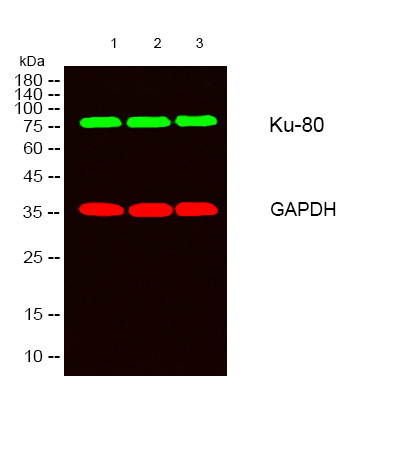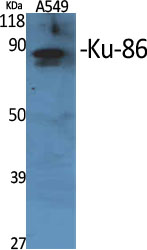lipin1 Phospho ser889 rabbit pAb
- Catalog No.:YP1796
- Applications:WB
- Reactivity:Human;Mouse;Rat
- Target:
- LPIN1
- Fields:
- >>Glycerolipid metabolism;>>Glycerophospholipid metabolism;>>Metabolic pathways;>>mTOR signaling pathway;>>Alcoholic liver disease
- Gene Name:
- LPIN1 KIAA0188
- Protein Name:
- lipin1 ser889
- Human Gene Id:
- 23175
- Human Swiss Prot No:
- Q14693
- Mouse Gene Id:
- 14245
- Mouse Swiss Prot No:
- Q91ZP3
- Immunogen:
- Synthesized peptide derived from human lipin1 ser889
- Specificity:
- This antibody detects endogenous levels of lipin1 ser889 at Human, Mouse,Rat
- Formulation:
- Liquid in PBS containing 50% glycerol, 0.5% BSA and 0.02% sodium azide.
- Source:
- Polyclonal, Rabbit,IgG
- Dilution:
- WB 1:500-2000
- Purification:
- The antibody was affinity-purified from rabbit serum by affinity-chromatography using specific immunogen.
- Concentration:
- 1 mg/ml
- Storage Stability:
- -15°C to -25°C/1 year(Do not lower than -25°C)
- Other Name:
- Phosphatidate phosphatase LPIN1 (EC 3.1.3.4) (Lipin-1)
- Molecular Weight(Da):
- 98kD
- Background:
- This gene encodes a magnesium-ion-dependent phosphatidic acid phosphohydrolase enzyme that catalyzes the penultimate step in triglyceride synthesis including the dephosphorylation of phosphatidic acid to yield diacylglycerol. Expression of this gene is required for adipocyte differentiation and it also functions as a nuclear transcriptional coactivator with some peroxisome proliferator-activated receptors to modulate expression of other genes involved in lipid metabolism. Mutations in this gene are associated with metabolic syndrome, type 2 diabetes, and autosomal recessive acute recurrent myoglobinuria (ARARM). This gene is also a candidate for several human lipodystrophy syndromes. Alternative splicing results in multiple transcript variants encoding distinct isoforms. Additional splice variants have been described but their full-length structures have not been determined. [provided by RefSeq, May 2012],
- Function:
- disease:Defects in LPIN1 are a cause of autosomal recessive acute recurrent myoglobinuria [MIM:268200]; also known as acute recurrent rhabdomyolysis. Recurrent myoglobinuria is characterized by recurrent attacks of rhabdomyolysis (necrosis or disintegration of skeletal muscle) associated with muscle pain and weakness and followed by excretion of myoglobin in the urine. Renal failure may occasionally occur. Onset is usually in early childhood under the age of 5 years.,function:Is involved in adipocyte differentiation.,miscellaneous:May represents a candidate gene for human lipodysytropy syndromes.,similarity:Belongs to the lipin family.,
- Subcellular Location:
- Cytoplasm, cytosol . Endoplasmic reticulum membrane . Nucleus membrane . Translocates from the cytosol to the endoplasmic reticulum following acetylation by KAT5. .
- Expression:
- Specifically expressed in skeletal muscle. Also abundant in adipose tissue. Lower levels in some portions of the digestive tract.
- June 19-2018
- WESTERN IMMUNOBLOTTING PROTOCOL
- June 19-2018
- IMMUNOHISTOCHEMISTRY-PARAFFIN PROTOCOL
- June 19-2018
- IMMUNOFLUORESCENCE PROTOCOL
- September 08-2020
- FLOW-CYTOMEYRT-PROTOCOL
- May 20-2022
- Cell-Based ELISA│解您多样本WB检测之困扰
- July 13-2018
- CELL-BASED-ELISA-PROTOCOL-FOR-ACETYL-PROTEIN
- July 13-2018
- CELL-BASED-ELISA-PROTOCOL-FOR-PHOSPHO-PROTEIN
- July 13-2018
- Antibody-FAQs

